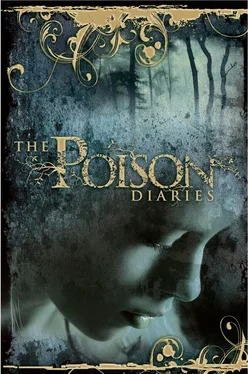By
Based on a concept by the Duchess of Northumberland

Copyright Copyright Dedication Chapter One Chapter Two Chapter Three Chapter Four Chapter Five Chapter Six Chapter Seven Chapter Eight Chapter Nine Chapter Ten Chapter Eleven Chapter Twelve Chapter Thirteen Chapter Fourteen Chapter Fifteen Chapter Sixteen Chapter Seventeen Chapter Eighteen Chapter Nineteen About the Author About the Publisher
First published in paperback in Great Britain by HarperCollins Children’s Books 2010
HarperCollins Children’s Books is a division of HarperCollins Publishers Ltd 1 London Bridge Street London SE1 9GF
Visit us on the web at www.harpercollins.co.uk www.poisondiaries.com
Poison Diaries is a registered trademark of Poison Diaries Ltd.
Text copyright © Poison Diaries Ltd 2010
All rights reserved under International and Pan-American Copyright Conventions. By payment of the required fees, you have been granted the non-exclusive, non-transferable right to access and read the text of this e-book on screen. No part of this text may be reproduced, transmitted, downloaded, decompiled, reverse engineered, or stored in or introduced into any information storage and retrieval system, in any form or by any means, whether electronic or mechanical, now known or hereinafter invented, without the express written permission of HarperCollins e-books.
Ebook Edition © 2017 ISBN: 9780007387045
Version: 2017-02-22
FIRST EDITION
Poison Diaries Ltd reserves the right to be identified as the author of the work.
Conditions of Sale This book is sold subject to the condition that it shall not, by way of trade or otherwise, be lent, re-sold, hired out or otherwise circulated without the publisher’s prior consent in any form, binding or cover other than that in which it is published and without a similar condition including this condition being imposed on the subsequent purchaser.
Find out more about HarperCollins and the environment at
www.harpercollins.co.uk/green
for Jane and her wonderful gardens
Cover Page
Title Page The Poison Diaries By
Copyright
Dedication
Chapter One
Chapter Two
Chapter Three
Chapter Four
Chapter Five
Chapter Six
Chapter Seven
Chapter Eight
Chapter Nine
Chapter Ten
Chapter Eleven
Chapter Twelve
Chapter Thirteen
Chapter Fourteen
Chapter Fifteen
Chapter Sixteen
Chapter Seventeen
Chapter Eighteen
Chapter Nineteen
About the Author
About the Publisher
15th March
G REY SKIES; THE RAIN CAME AND WENT ALL MORNING.
A cold wind blew in gusts, worsening as the day went on, until the lowest branch of the great chestnut tree in the courtyard splintered down the middle and crashed to the ground. If I had been standing underneath, I would have been crushed.
Spun wool after breakfast. Read for a short while, but my eyes ached too much from sewing to continue long. Changed the soaking water for the belladonna seeds.
Father is still not home; it has been two days.
The berries of the belladonna plant are beautiful. I have always thought so. I would string the plump black pearls on silk thread and wear them around my neck if they were not so deadly.
The seeds are nearly as poisonous as the berries; Father has warned me a thousand times. But I am careful. First I tie the seeds in clean muslin bags and drop them in a pail of cold water. Before they can be planted they must soak for at least two weeks, and I must change the water every day. That is how Mother Nature would do it: the snow would fall and melt and then fall again. And it would be too risky to leave the seeds in the ground during the cold months; they might get eaten by birds and carried away to grow in some distant field, where they could wreak their mischief without warning. Instead I make-believe a winter for them, to trick them into growing only when and where I wish.
Even after all that care, only a few seeds will sprout, and of those half will soon shrivel back into the dirt. Are you so in love with death, lovely lady? I call you lovely lady, for that is what ‘belladonna’ means. You are curiously reluctant to be born. Is our world not beautiful enough for you? Or perhaps there is another, more perfect realm in which you prefer to dwell?
I laugh at myself now; what foolish imaginings! But when Father is away I must make do with whatever companions I can find: a sparrow on the windowsill, a shadow on the wall, or even a tiny, dangerous seed. We have lived alone here among the ruins for so long, Father and I, and he is away so much, and is so silent and lost in his own thoughts even when he is here, I sometimes worry I might lose my speaking voice completely from lack of use.
Let me test it.
“Hello.”
“Hello?”
Feh! I sound like a frog. A tincture of lemon balm and anise would cure this broken voice of mine.
Or someone to talk to. That would do it too.
I wonder where Father has gone this time. Someone must be very ill to keep him away from home so long. Father is not a doctor, nor is he a “butcher” (that is what he calls the surgeons). But high born or low, when the people of Northumberland are sick, they send for Thomas Luxton. On the rare times when Father has let me go to market day and walk through the crowds, with my cloak pulled close around my face (he does not wish me to speak to anyone, for he says they will try to trick me into revealing secrets about his work), I hear the things they say:
“You’re better off with Luxton than those universi-tytrained doctors, with their ointments that blister the flesh, and their buckets to fill with your blood.”
“Doctors! Tell ‘em you’ve got a sore toe and they’ll take a hacksaw to your leg!”
“Luxton may be an odd duck, but at least he doesn’t burn you and bleed you and stick you all over with leeches. Luxton follows the old ways, the lost ways…”
“ …the witches’ ways, ” some of them might add in a fearful whisper.
But Father would scorn the very notion of witchcraft. People call him an apothecary, but he considers himself a man of science, and a “humble gardener,” as he likes to say. By that he means that he grows all the plants he needs to make his medicines right here, in the garden beds that surround our stone cottage. He grows other plants too, in a separate walled garden behind a tall, black iron gate. The gate is held shut by a heavy chain, fastened with a lock that is bigger than my fist.
When I was small, Father warned me morning and evening never to approach the locked garden, until I was so afraid I couldn’t sleep without dreaming of snakes chasing me. The snakes’ bodies were links of thick metal chain, and their gaping jaws clicked open and shut like a lock, catching at my heels no matter how fast I ran. Finally I asked Father: “Why would anyone grow bad plants that have to be locked up behind walls? Why not only grow the good ones, and let the bad ones wither and die?”
“Plants are part of nature; they are neither good nor bad,” he replied, drawing me to his knee. “It is the purpose we put them to that matters. The same plant that can sicken and kill an innocent girl like you can, if mixed in the right proportions, make a medicine that saves a young man from typhoid or cures a baby of the measles.”
Читать дальше


![Никки Сикс - Героиновые дневники. Год из жизни павшей рок-звезды[The Heroin Diaries - A Year in the Life of a Shattered Rock Star]](/books/78612/nikki-siks-geroinovye-dnevniki-god-iz-zhizni-pavshej-rok-zvezdy-the-heroin-diaries-a-yea-thumb.webp)










